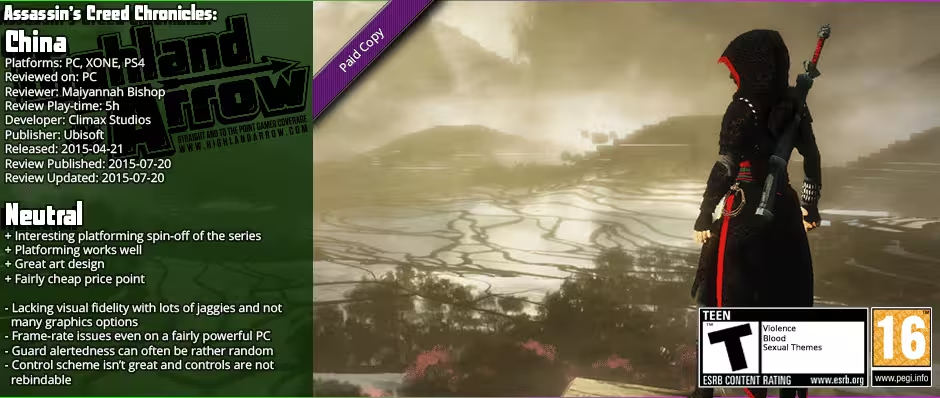

Assassin's Creed Chronicles: China is the first in the 'Chronicles' series of spin-off platformer games developed by Climax Studios and published by Ubisoft. A lot of people were somewhat sceptical of this spin-off series when it was first announced, but I have to admit it flew under my radar for the most part. Ubisoft doesn't have the best track record for partnerships with third-party developers of late, so I can't say I paid much attention. Originally intended to be a small game included as part of one of three in the series promised with the Assassin's Creed: Unity season pass, it has since been released as a stand-alone title given the cancellation of that season pass in the face of the severe technical issues that Unity had. That said, ACC: China is actually a fairly interesting game, if a moderately-flawed one, so it was a somewhat intriguing thing to dig through of late, having grabbed it on a sale at Nuuvem. There's some decent design at play here, let down by systems that make the game a little too easy, random behaviour that creates artificial difficulty mistaking it for real difficulty, and some series lack of technical acumen.
Engine issues are at the heart of ACC:China's technical problems
The funny thing here is I could hardly say why this is the case; it proudly advertises in the opening logos that it's based on Unreal Engine, which is well-trodden ground when it comes to graphics engines now, and yet at most times the game was bouncing wildly between 30 and 50 FPS (based on uPlay's own frame counter). There's really no conceivable reason this should be the case. Assassin's Creed: Rogue, a much more demanding game, never dropped below the 60 FPS the frame cap seemed to be at when I played it for review recently, and it's a fully-realised 3D sandbox world with a lot of complex graphics. China meanwhile has trouble staying above 30, and we're talking much less complex graphics with several degrees of magnitude less polygons on display, so the fact that it renders at such a relatively-low frame-rate is a puzzlement to me. I can only assume that it was developed primarily for console and that the port is not very well optimised.
This bleeds into a second issue of the game - there aren't many graphics options for the game either. I should note that ACC:China was getting that sub-optimal frame-rate at 720p, since that's the most it would allow me to run at, as opposed to the 1080p I ran Rogue and indeed most other modern games that don't support the higher native resolution of my monitor I play games on. There's basically no options to tweak to get a higher frame-rate to speak of: you get resolution, v-sync, full-screen on or off, and that's about it. And when I say resolution, it's not really an option most of the time - I was stuck in 720p with no option to change it if I was in full-screen, despite that being well below the native resolution of my display device. Furthermore, the options menu is only accessible via the main menu and the save system is entirely check-point based, so I got really familiar with one section of the game as I was trying to get the game to run at a decent clip. Thankfully the checkpoints are generally pretty generous, but there's no likewise no excuse for not having a proper save system in the game, especially when, again, the mainline Assassin's Creed games have one.
The controls are pretty clunky
There's no rebindable controls either - you're stuck with the default setup. I had little issue with the actual bindings though, more the design of them. For example, to throw a firecracker to distract a guard, you need to first select that item with the hotkey, then press and hold F to target it, using the WASD keys to move the target, then you need to press G to actually throw it. I can't imagine this gets any better on the controller, even if it'd be using the stick, this is just far more buttons than should be necessary to perform the task. Surely in a pinch, we aren't going to want to fuss with fine targeting either, and indeed the challenge later in the game is less the actual situations or the AI, which is servicable but not particularly clever, but rather that you're called upon to use these tools in time constraints and other situations of stress and you're not going to be doing fine aiming in real-time while five guards with large swords are busily trying to carve you up into an assassin steak dinner.
The actual parkour is, to it's credit, kept fairly free-flowing and intuitive, but it falls victim to a couple of bugbears, one of the genre, and one of the AC series. First of all, it's not always readily apparent what is and is not on the same "plane" as you are, since this is a 2.5D platformer to use a terrible term, and as such you can end up making leaps to your death because you thought you'd be able to grab something and couldn't. The early game is fairly straight-forward and avoids that, but as the levels become more complex this becomes more of an issue. Secondly - a related bugbear that's a long-time spectre of the Assassin's Creed series - it's not always clearly sign-posted what you can and cannot climb and parkour on. ACC: China actually does a better job of this than many Assassin's Creed games, but there's a lot of things you may logically assume you could grab onto that you cannot, such as wooden posts sticking out of a building that serve as obstructions rather than convenient hand-holds. It's not terribly frustrating and I found myself getting around a lot easier than many AC games, but in a platformer, this kind of stuff needs to be nailed and rivetted down. This is what a platformer has to do right - most everything else is polish.
ACC: China's story with Shao Jun is pretty simple,
but fairly compelling as far as the Assassin's Creed stories go
The game places you in the hidden-blade-equipped boots of Shao Jun, a former concubine of the previous, now dead Emperor of China whom was recruited - "saved" to hear the game tell it - into the Assassin Order, only to watch it largely wiped out by an organisation backed in secret by the Templars. The game starts with you captured, and a device falling into the hands of said ruffians, but we quickly find out this was a ruse by Shao Jun to get close to her assassination target, and after some sneaking around the base (or murdering your way out, the game lets you go either way), you find yourself committing your first of many assassinations.
I found myself somewhat compelled by the story-telling of ACC: China. Presented mostly either organically through environmental story-telling in the missions, and in between missions with intro and outro cutscenes consisting of hand-painted style drawings animated over dialogue, the game is fairly different to the usual Assassin's Creed formula when it comes to story both in it's method of telling and in its missions. While it's a fairly simple story of over-arching revenge distilled to it's basest essentials, it has enough plot points that contrast with the usual AC tropes that I found myself wanting to continue to just to see how it all panned out. I'm not sure this would be a game that'd see a lot of replay, mind you, but it's fair to say that the story did a lot to carry an otherwise mediocre game.
Notably, the game does a very good job of remaining familiar enough to Assassin's Creed fans to not alienate them, while having enough new stuff to present to remain feeling fresh and inventive. The new setting has a lot to do with that, and it's somewhat of a pity that it seems unlikely we'll see too much expansion on Shao Jun as a protagonist, because she presents a fairly interesting one.
Mechanically the game is pretty sound,
if fairly unchallenging - the way to progress is usually obvious
Beyond the aforementioned control problems, the game mechanics at play here offer a moderately-deep bag of tricks, if not a very challenging ones. You're given the usual assassin bag of tricks, though many of them are variations based around the platforming mechanics. It follows a simple stealth thing: you want to stay out of line of sight of alert guards. Unfortunately, they make that line of sight bleeding obvious with a cone that displays in high contrast lest you not miss it, so it's very easy to stay out of sight. (I probably would have been alright with this if they did this in the eagle vision but not the normal vision, but no, this is a regular thing, for the record.) You have four general tools of distraction and circumvention: you can whistle to draw their attention to where you are presently and then get around them, you can toss a firecracker for a short-ranged distraction, you can throw a "noise dart" that essentially acts as a long-range firecracker, and you can use throwing knives either to eliminate guards at a range (risky, though, as you have to be very accurate to pull that off and many can take more than one hit), or much more often, to sever ropes that hold up drawbridges, either to cross them, or to squish unfortunate dim-witted guards standing under them. It's a fairly standard tool-kit, but one that works fairly well, and the game utilises in a variety of intriguing ways that keep it fresh for the most part.
One of the strongest points in ACC: China's mechanics is actually the level design - there's always multiple paths through the level and they reward different play-styles. At the end of each segment you get a "shadow", "assassin", or "brawler" rating depending on that play-style and the game is entirely viable on any of them. Shadow refers to staying entirely undetected and fighting no-one except assassination targets, assassin refers to remaining entirely undetected but murdering guards that get in your way, and brawler refers to fighting your way through the level. Most notably, and something Dishonored did wrong in my opinion, neither of these play-styles are really objectively better than the other. Brawler avoids the faffery of having to stay undetected but you have lengthy combats, shadow, vice versa.
The combat is actually fairly strong for a platformer, but nothing too new to Assassin's Creed fans. You are given a way to roll by an opponent to maneuver past them, if you block them, but that's the only new bit, and one necessitated by the 2D platforming aspect no doubt. The rest of the rigmarole is familiar - light attack, heavy attack, and counter. That counter-attack is still pretty powerful, but the AI is actually smart enough to back off if it's getting beat, so you cannot just rely on the counter button to kill everything, which does offer some mild challenge. The animations here are pretty tight, the controls are responsive if requiring a few too many buttons once again, and it works in general pretty well, so I don't have any real complaints about the combat, it just isn't going to set the world on fire.


